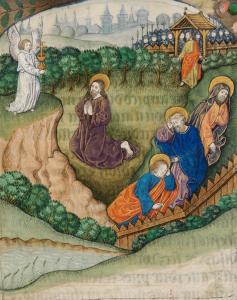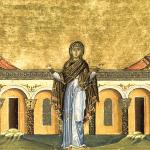
The mystery of the incarnation transcends human comprehension. Whenever we try to describe who Jesus is, it is easy for us to get something wrong, as we tend to think of the God-man, Jesus, mostly in relation to either his divinity or his humanity, losing sight of his other nature. Likewise, we might be so focused on Jesus’ two natures, we find it difficult to describe his personal unity, or else we find ourselves focusing on that unity that we find it difficult to conceive how he can preserve his two natures in an unconfused manner. Often, our confusion is benign, because we know and agree with the basic foundations of Christology, that is we affirm Jesus is truly God and human, one person with two natures. The problem is when we end up ignoring (and possibly forgetting) this and let ourselves go too far astray with our descriptions of Christ that we end up effectively taking away one of the features we otherwise proclaim. That is, we end up distorting our image of Christ as we focus too much on one element of the truth that other elements eventually disappear from our discussion, even if they are not outright denied.
Many of the early councils of the church focused on establishing the foundations we needed for us to effectively talk about Christ; they did such an effective job that when we go astray, we can be brought back to those foundations through their declarations. They established norms which help regulate our theological exploration. Nonetheless, we can easily forget how difficult it was for the councils to do this in the first place; when they were convened, Christians didn’t have a unified vocabulary to use to describe the God-man. For this reason, it can be said that many of the controversies in those councils concerned the establishment of that vocabulary (though at the time of the councils, it was not always apparent to those involved that they really agreed with each other more than they differed, and that the problem lay more with the way they understood the words they used than what they wanted to say about Christ).
When we look back at the earliest theological explorations in Christology, it is easy to see that the divinity of Jesus was emphasized far more than his humanity, and this defect allowed for many of the earliest Christological controversies to emerge. For, in many instances, his humanity became deficient and in this manner, our own humanity became suspect. This implied that only a part of us, not our whole being, would have a place in eternity. This not only can be seen in the way some denied Jesus as having a soul, but also in the way many later denied a human will to Jesus. Once Jesus’ will was denied, it could be and would be easy to deny the value of our own will and its freedom.
The Third Council of Constantinople (680-681) confirmed that Jesus had two wills, one divine, one human, and therefore, there was a place in eternity for the human will. Indeed, it affirmed that our will would find its true and proper freedom in heaven. Part of the process of our deification is to have our will freed from all its unnatural bondage, bondage established in and through sin.
Jesus, while fully human, was not bound by the dictates of sin, and so lived a truly free human life. Nonetheless, he showed himself connected to the world and what happened in it, indicating to us that while such freedom is possible, we must not confuse it as being an individualistic freedom which has no ties with the rest of humanity. Our freedom, like his, is a personal freedom, and so it is relational, affected by the actions of others. What others do can and will have an influence on what happens to us. Free will must not be misconstrued as something it is not: it is not the ability to have any of our wishes fulfilled rather, but instead, it is the ability to act according to the good of our nature without some ignorance of the good or weakness of our ability getting in the way of doing such good. We are called to do good and attain the good proper to our nature, and we are able to do so, despite the wounds of sin, because of grace. Whatever mistakes, whatever errors we have made can be forgiven us, and the harm done by it overcome by grace, because God loves us and wants to free us with that love.
God is patient, always loving us no matter what we have done, always willing to show us mercy by giving us whatever healing grace we need. The more we open ourselves up to God’s love, the more we receive grace and find ourselves attaining the freedom which we desire. Once we have returned to the purity of our nature, we will find ourselves reflecting God, and finding that our nature, which is in the image of God, is in the image of love. True freedom is the freedom to love, and so this is what is reflected in Jesus’ human will. He acted with such love, and nothing held him back from doing so. Likewise, we are given examples of many saints, many holy people, who were once great sinners, so that in and through them we can be shown God’s patient love will not be constrained by our sin. They were raised up and made holy, despite whatever things they might have done, and so we, looking at their example, know we should never give in to despair but realize we too can be transformed and made better:
The saying is sure and worthy of full acceptance, that Christ Jesus came into the world to save sinners. And I am the foremost of sinners; but I received mercy for this reason, that in me, as the foremost, Jesus Christ might display his perfect patience for an example to those who were to believe in him for eternal life (1 Tim. 1:15-16 RSV).
Just as we must not give into despair, so we must not give into sin, for sin is founded upon some distortion of the good, even as heresy is founded upon some distortion of the truth. When we stumble, it is not as if we do not have some good intention behind what we do; rather, we limit the good and so find ourselves trapped within the limits, turning us the away from the greater good which we should be engaging. It is through love where we find ourselves moving beyond all such limits and find ourselves being set free, and when we are set free, we will see understand what freedom really is (and what it is not). We are vouchsafed such freedom as being a part of who we are, as being what we are meant to have, and we will have it so long as we let our will be guided by love. For it is through such love we will receive the love of God, the love which grants us the transcendent, deifying grace which we need to sustain our freedom. Thus it can be said that the freedom of the will is established not through deliberation but through love. Once we understand this, we can better appreciate the two wills in Christ, for then we see how and why they work in unison despite their different foundations, for both work in and through love and are free because of such love.
Stay in touch! Like A Little Bit of Nothing on Facebook.
If you liked what you read, please consider sharing it with your friends and family!













